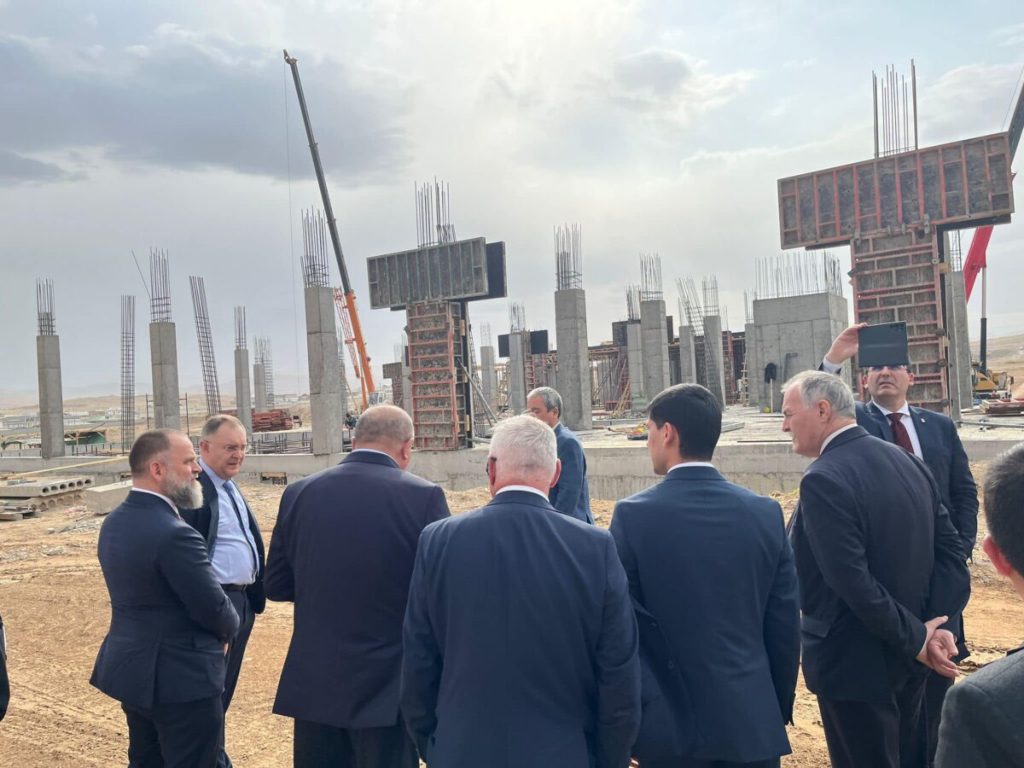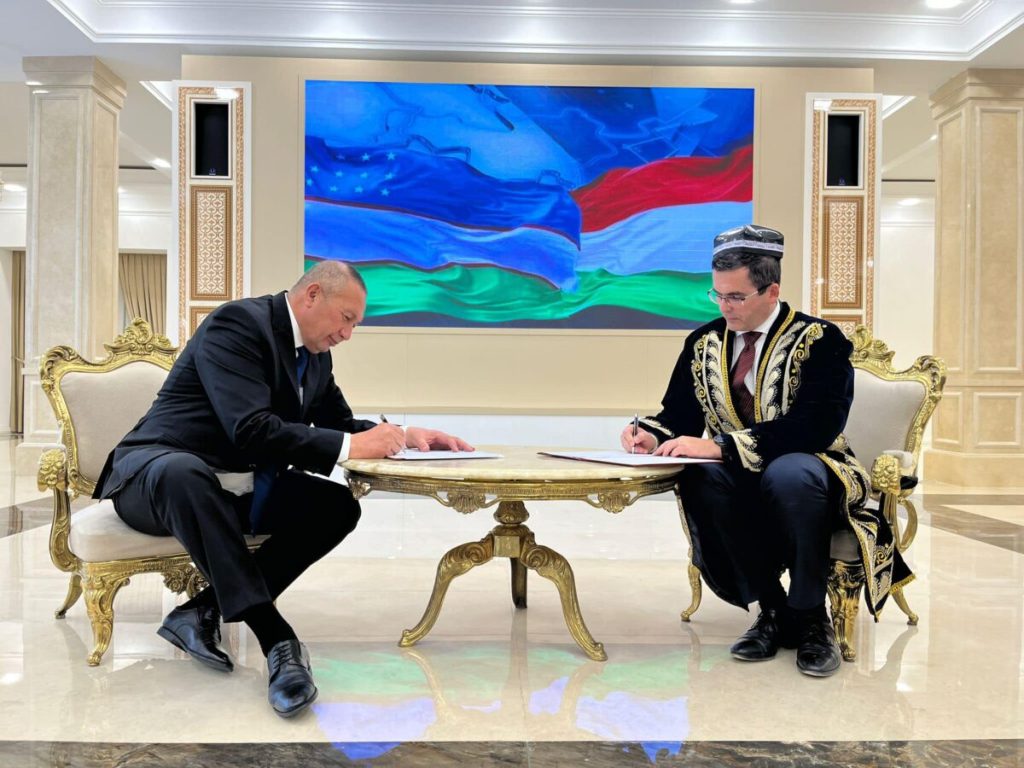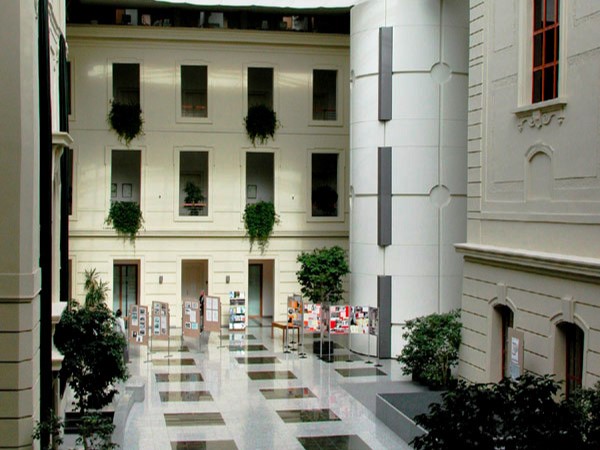One of the greatest successes of our professional work is that the first innovation science park of Uzbekistan is being implemented with the participation of Óbuda University – emphasized Prof. Dr. Levente Kovács, Rector of Óbuda University, on the visit of the university delegation to Uzbekistan between 17-19 October. ÓU was the special guest of Innoweek, the most important innovation event in Uzbekistan. The scientific conference and exhibition provided an opportunity to meet partner institutions and conclude agreements,” he added, highlighting the participation in the creation and operation of the Inno-Technopark in Jizzakh in eastern Uzbekistan, and the agreements concluded and to be concluded with two universities in Tashkent on mobility and the possibility of dual degrees.
The delegation of the Óbuda University as special guests of Innoweek, the most important innovation event in Uzbekistan – Prof. Dr. Levente Kovács, Dr. Monika Pogátsnik Deputy Dean (AMK), Prof. Dr. Györök György Dean (AMK), Prof. Dr. Zoltán Rajnai, Dean (BGK), Botond Fehér, Director General of Directorates-General for Economic and Financial Affairs, Csaba Sebestyén, Project Manager of the Industries of the Future Technology and Innovation Park in Zsámbék and Antal Németh, Project Manager of the Smart Industry Technology and Innovation Park in Kaposvár – to Tashkent, where they presented the most important achievements of the past years in a large-scale exhibition at the Ministry of Higher Education, Science and Innovation.

Uzbekistan is investing a lot of energy and resources in the future, which primarily means the development of higher education, scientific life and innovation areas – Prof. Dr. Levente Kovács pointed out, who said that it is of particular importance that the Uzbek partners see in Óbuda University an opportunity on which continuous and long-term ideas can be built. Ibrokhim Abdurakhmonov, Minister of Higher Education, Science and Innovation and Honorary Doctor of our University, considers Óbuda University as one of the most important bases in Hungary, it was revealed during the recent short meeting.
Uzbekistan-Hungary Inno-technopark
A quadripartite agreement was signed in the framework of Innoweek, according to which the Óbuda University, the Uzbek Innovation Development Agency, the Jizzakh region of Uzbekistan and the Tashkent Institute of Chemical Technology will establish a science park (Inno-technopark) in Jizzakh, Eastern Uzbekistan.
Óbuda University is playing a key role in the creation of Uzbekistan’s first innovation technology park, he said. Prof. Dr. Levente Kovács after a meeting with Dr. Ergash Saliev, the head of the Jizzakh region. He noted that besides three science parks in Hungary, the ÓU has become an active participant in one foreign investment. The Óbuda University’s international standing is demonstrated by the fact that the Hungarian side of the Inno-Technopark in Uzbekistan is represented by the Óbuda University,” the Rector pointed out.
According to the agreement just signed, the ÓU, in consortium with the TICT, will own 50 percent of the project, with the Jizzakh region owning the other half. The ÓU and TICT have agreed to participate in the development of the focal areas, including long-term research participation, definition of the technical content and procurement of the necessary laboratory and production equipment.
In the Inno-Technopark, which is already under construction in Jizzakh, it is planned to place a high priority on experiential knowledge transfer, which means that emphasis will be placed not only on science in the strict sense but also on the visual understanding of science.
In the last year, the world has changed dramatically, with the European Union’s discriminatory regulatory system leading us to look for partners outside the EU. It seems that the knowledge of Óbuda University’s experts is in demand in many places, both within and beyond our borders,” said Prof. Dr. Levente Kovács.
The Inno-Technopark investment has already started, with 2,500 square metres of reception and service space on three levels.

Jizzakh, where the fourth science park of the ÓU is being built
Jizzakh is one of Uzbekistan’s fastest growing cities, with a population of around 400,000 people, almost half of whom are under 18, and education is therefore very important in the city. Jizzakh has a large youth population, with five universities in the city for young people living locally or in the surrounding area. The delegation from the ÓU visited a well-equipped medical simulation laboratory at Kazan Federal University (KFU) and the high quality IT training at Sambhram University. The Hungarian delegation also visited Jizzakh IT Park and the local Football Academy to gain experience.

Inter-university cooperation
Further strengthening international relations, agreements on further cooperation have been reached with two universities in Tashkent – reported Prof. Dr. Levente Kovács.
An agreement was reached with the Rector of TIIAME National Research University, Prof. Dr. Bakhadir Mirzaev, to continue the previous joint projects – strengthening student and faculty mobility and joint curriculum development – and to establish a double degree programme. The two universities are conducting joint educational projects mainly in the fields of geoinformatics, precision agriculture and mechatronics. A further aim is to develop a joint MSc programme with TIIAME in the longer term.
They also discussed the joint Inno-technopark with Prof. Botir Usmonov, Rector of the Tashkent Institute of Chemical Technology (TICT), and defined six basic directions: IT cybersecurity and programming with priority areas, industrial robotics, smart construction, medical technology, precision agriculture, technology transfer and innovation management.
It was also agreed that the TICT’s new campus could host an Óbuda University department.
In addition, joint master’s degrees in innovation management, industrial economics, cyber security and engineering are planned to be offered from 2024 in the form of a double degree.
An example of cooperation between higher education and industry
The educational centre of Artel, one of the largest electronics manufacturers in Central Asia, has also provided many innovations, said Prof. Dr. Levente Kovács. The company works closely with our partner institution, the Tashkent Institute of Chemical Technology (TICT), in the field of research and training. Their training centre is equipped with state-of-the-art facilities in robotics, plc, welding and even plastics processing. The company from Tashkent has shown great interest in the dual training of the Óbuda University, and at the meeting they also discussed how they could apply the methods that have been tried and tested at the University.
The Artel Group started its operations in 2011 with the production of gas cookers and now manufactures more than 20 categories of household appliances, including air conditioners, microwaves, mini ovens, gas and electric cookers, televisions, refrigerators, mobile phones, built-in appliances, vacuum cleaners, range hoods, small appliances, among others, as one of the largest suppliers in Central Asian countries.
The company’s managers said that the key to their relatively rapid success is the emphasis placed from the outset on developing links with universities and strengthening innovation processes.


